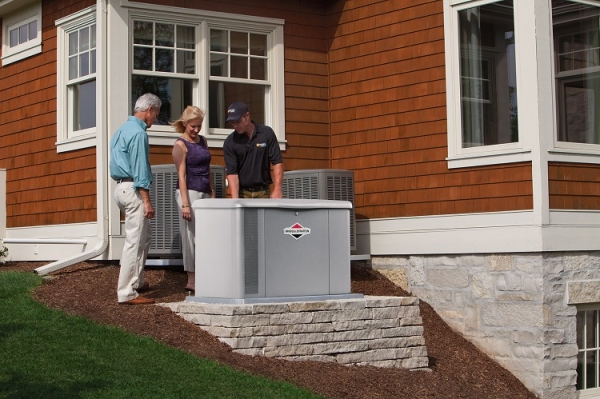When the power goes out, you depend on your generator to keep your heating or cooling system running, keep your perishable food safe, and provide the power you need to stay comfortable no matter how long the outage lasts.
An older generator may be able to do this just fine, but if your generator isn’t as reliable as it used to be, it may be time to consider upgrading to a new system. Being proactive and replacing your generator is usually the best option for your comfort and safety.
Here are some of the most common signs that it’s time for a standby generator replacement:
Startup Difficulty
One of the key benefits of having a standby generator versus a portable generator is that it starts up automatically when the power goes out.
If your generator is having trouble starting, call a professional to inspect your unit. You could have issues with the battery, charging system, or ignition system. Otherwise, you may be dealing with a loss of compression, stuck valves, or worn bearings.
A new generator is likely the best option for optimal performance and dependability.
Low Fuel Efficiency
If your generator uses more fuel than it used to, it may be due to engine wear and tear. As your generator loses compression, the engine speed and fuel consumption may increase to maintain full power output.
These symptoms will only worsen with age, so it is a good idea to replace the generator before it fails completely.
Constant Repair Needs
When the generator breaks down often and needs frequent repairs, it may not work properly during an emergency.
Keeping your family comfortable and protected during the next power outage is your priority, so it may be best to replace your unreliable generator.
Inconsistent Power Output
As your generator ages, wear and tear on the engine can cause surging. Combine this with aging electronics and bad capacitors, and the result can be erratic or inconsistent power output that could harm sensitive devices like computers and smart thermostats.
A new generator will ensure you have a safe, dependable power output.
Improper Size
If your standby generator is undersized for your home, the excess strain on the unit will significantly reduce its life span, and it may not provide the clean, consistent power you need for all your devices.
To estimate your power needs, add up the wattage of all the devices you’ll need during a power outage, namely large appliances and systems like HVAC systems and stoves, and compare them to the rated output of the generator.
If the total is more than 50% to 75% of the generator’s maximum output, you may need to upgrade, as generators work most efficiently and last longer at about 50% capacity.
Long Service Life
Most whole-home generators will last about 25 to 40 years, depending on how often they’re used and how well they’re maintained.
If your generator is approaching the end of its service life and is starting to have problems, it is probably time for an upgrade. You can see dramatic performance and reliability improvements by replacing an older system with a modern generator.
Contact Comfort First for Whole-Home Generator Replacement in North Carolina
When it is time for a standby generator replacement in North Carolina, turn to our team at Comfort First Heating & Cooling.
We offer whole-home generator installations featuring high-performance standby generators from Briggs & Stratton, one of the most respected manufacturers in the industry. By installing a new generator, you can enjoy:
- Greater power output
- Quieter operation
- Greater fuel efficiency
- The latest features, like remote monitoring
- And more
At Comfort First, our technicians can help with all your whole-home generator service needs, from installation and replacements to repair and maintenance. We make upgrading your generator easy with convenient financing options and upfront pricing.
Call 800-279-4822 or contact Comfort First online to request a free quote for a whole-home generator replacement in Fayetteville, Charlotte, Raleigh, Chapel Hill, or the surrounding areas.

 3x" class="mb-4 img-fluid h-auto position-relative z-index-9" alt="ribbon image" width="333" height="89">
3x" class="mb-4 img-fluid h-auto position-relative z-index-9" alt="ribbon image" width="333" height="89">














